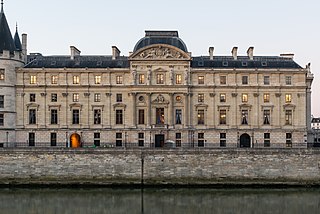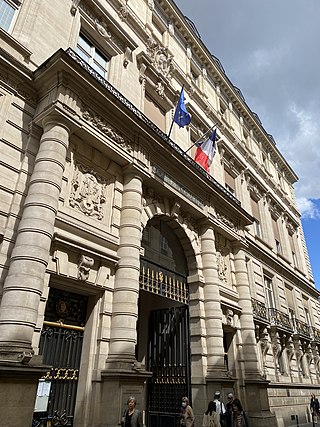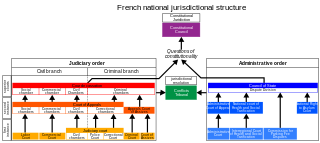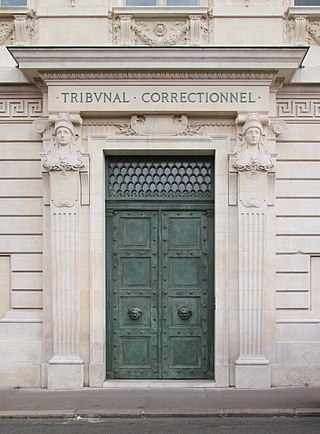
Criminal justice is the delivery of justice to those who have been accused of committing crimes. The criminal justice system is a series of government agencies and institutions. Goals include the rehabilitation of offenders, preventing other crimes, and moral support for victims. The primary institutions of the criminal justice system are the police, prosecution and defense lawyers, the courts and the prisons system.

The Court of Cassation is the supreme court for civil and criminal cases in France. It is one of the country's four apex courts, along with the Council of State, the Constitutional Council and the Jurisdictional Disputes Tribunal.

The Palais de Justice, is a judicial center and courthouse in Paris, located on the Île de la Cité. It contains the Court of Appeal of Paris, the busiest appellate court in France, and France's highest court for ordinary cases, the Court of Cassation. It formerly housed the Tribunal de grande instance de Paris which was relocated in 2018 to a new high-rise building in Paris's Batignolles neighborhood. The Palais de Justice occupies a large part of the medieval Palais de la Cité, the former royal palace of the Kings of France, which also includes Sainte Chapelle, the royal chapel, and the Conciergerie, a notorious former prison, which operated from 1380 to 1914. It is located in close proximity to the Tribunal of Commerce, the Prefecture of Police of Paris, and the offices of the Paris Bar Association.

The Cour des Comptes is France's supreme audit institution, under French law an administrative court. As such, it is independent from the legislative and executive branches of the French Government. However, the 1946 and 1958 French constitutions made it the Court's duty to assist the Cabinet and Parliament in regulating government spending. The Court thus combines functions of a court of exchequer, comptroller general's office, and auditor general's office in common-law countries. It is also a Grand Corps of the French State and mainly recruits among the best-ranked students graduating from the Ecole nationale d'administration.

The judicial system of Turkey is defined by Articles 138 to 160 of the Constitution of Turkey.

French law has a dual jurisdictional system comprising private law, also known as judicial law, and public law.
In France, a cour d'assises, or Court of Assizes or Assize Court, is a criminal trial court with original and appellate limited jurisdiction to hear cases involving defendants accused of felonies, meaning crimes as defined in French law. It is the only French court that uses a jury trial.

The Court of Cassation of Belgium is the supreme court of the Belgian judiciary. The court is composed of thirty judges with life tenure who are nominated by the High Council of Justice of Belgium and appointed by the Belgian federal government. The court handles cases in the two main languages of Belgium, Dutch and French, and provides certain facilities for cases in German. The court is assisted in its work by a public prosecutor's office and a bar association, which both function separately from other structures. The duty of the public prosecutor's office is to provide advisory opinions to the court on how the law ought to be interpreted and applied. The attorneys of the court's bar association assist litigants in proceedings before the court; in certain cases, their assistance is mandatory.

In most legal jurisdictions, a supreme court, also known as a court of last resort, apex court, and highcourt of appeal, is the highest court within the hierarchy of courts. Broadly speaking, the decisions of a supreme court are not subject to further review by any other court. Supreme courts typically function primarily as appellate courts, hearing appeals from decisions of lower trial courts, or from intermediate-level appellate courts.
In France, the Tribunal d'instance is a judicial lower court of record of first instance for general civil suits and includes a criminal division, the Police Court, which hears cases of misdemeanors or summary offences (contraventions). Since it has original jurisdiction, the Court's rulings may be appealed to a French appellate court or Supreme Court. The court was formerly known as a Justice of the Peace Court until the judicial restructuring of 1958.

The tribunals of first instance are the main trial courts in the judicial system of Belgium. The tribunals of first instance are courts of general jurisdiction; in the sense that they have original jurisdiction over all types of cases not explicitly attributed to other courts. They handle a wide range of civil cases, criminal cases, and cases under the scope of juvenile law and family law. They also hear appeals against the judgements of the police tribunals and justices of the peace. The judgements of the tribunals of first instance can be appealed to the courts of appeal in turn. There is a tribunal of first instance for each of the twelve judicial arrondissements ("districts") of Belgium, except for the arrondissement of Brussels. The arrondissement of Brussels has two tribunals of first instance, a Dutch-speaking one and a French-speaking one, due to the sensitive linguistical situation in the area. The territories of the current judicial arrondissements largely coincide with those of the provinces of Belgium. Most of the tribunals of first instance have multiple geographical divisions, with each having their own seat. As of 2020, the 13 tribunals of first instance have 27 seats in total. Further below, an overview is provided of all seats of the tribunals of first instance per arrondissement.

The courts of appeal are the main appellate courts in the judicial system of Belgium, which hear appeals against judgements of the tribunals of first instance, the enterprise tribunals and the presidents of those tribunals in their judicial area. There are five courts of appeal for each of the five judicial areas, which are the largest geographical subdivisions of Belgium for judicial purposes. The division of the Belgian territory into the five judicial areas is laid down in article 156 of the Belgian Constitution. A judicial area covers multiple judicial arrondissements ("districts"), except for the judicial area of Mons. Each arrondissement has a tribunal of first instance. Further below, an overview is provided of the five courts of appeal and the judicial arrondissements their judicial area covers. It is important to note that the courts of appeal do not hear appeals against judgements of the labour tribunals; these are heard by the courts of labour.

The court of labour is the appellate court in the judicial system of Belgium which hears appeals against judgements of the labour tribunals and the presidents of those tribunals in their respective judicial area. There are five courts of labour for each of the five judicial areas, which are the largest geographical subdivisions of Belgium for judicial purposes. Some of the courts of labour hear cases in multiple seats. Further below, an overview is provided of the five courts of labour and their seats. Whilst their territorial organisation is the same, the courts of labour are separate from the courts of appeal, which are the main appellate courts in Belgium.

The judiciary of Belgium is similar to the French judiciary. Belgium evolved from a unitary to a federal state, but its judicial system has not been adapted to a federal system.
The judiciary of Luxembourg comprises a number of courts.

The Judiciary of the Netherlands is the system of courts which interprets and applies the law in the Netherlands.

In French law, the ministère public or le parquet is the authority charged with defending the interests of society and of the application of law. It is primarily made up of magistrates, but is sometimes represented by other persons such as police officials. Its magistrates can be referred to as "standing" magistrates, as opposed to magistrats du siège. Its closest equivalent in some English-speaking countries is the director of public prosecutions and the attorney general in others.

In France, a cour d’appel of the ordre judiciaire (judiciary) is a juridiction de droit commun du second degré, a. It examines judgements, for example from the correctional tribunal or a tribunal de grande instance. When one of the parties is not satisfied with the verdict, it can appeal. While communications from jurisdictions of first instance are termed "judgements", or judgments, a court of appeal renders an arrêt (verdict), which may either uphold or annul the initial judgment. A verdict of the court of appeal may be further appealed en cassation. If the appeal is admissible at the cour de cassation, that court does not re-judge the facts of the matter a third time, but may investigate and verify whether the rules of law were properly applied by the lower courts.

In France, the correctional court is the court of first instance that has jurisdiction in criminal matters regarding offenses classified as délits committed by an adult. In 2013, French correctional courts rendered 576,859 judgments and pronounced 501,171 verdicts.
In France the jurisdictions of the ordre judiciaire, of the French court system are empowered to try either litigation between persons or criminal law cases. They may intervene:














